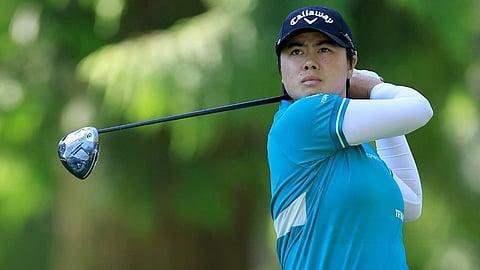
- NEWS
- the EDIT
- COMMENTARY
- BUSINESS
- LIFE
- SHOW
- ACTION
- GLOBAL GOALS
- SNAPS
- DYARYO TIRADA
- MORE

Maxine Esteban and Yuka Saso will go down as the biggest ‘what-ifs’ in the history of Philippine sports.
But although they are now playing for different flags — Esteban for Ivory Coast and Saso for Japan — they will still march to the Paris Olympics with their heads held high with their heart pumping for the Philippines.
The 22-year-old Esteban, a prodigious fencer, recently made headlines when she decided to represent Ivory Coast.
She said this move was driven by a desire to gain more competitive experience and contribute to the sport’s growth in a country where fencing is still developing.
Despite the switch, Esteban’s heart beats with pride for the Philippines.
“I am, and always will be, proud to be Filipino,” said Esteban, an eight-time national champion in women’s foil event before suffering an injury in the World Fencing Championship in Cairo in 2022.
She took a leave of absence from the Philippine Fencing Association but was no longer allowed to return upon her recovery, prompting her to switch nationalities to Ivory Coast.
“Every time I step onto the piste, I carry with me the spirit of the Philippines.”
Esteban’s recent achievements speak volumes about her dedication and skill. At the African Fencing Championships recently, she clinched the silver medal against a powerhouse foe from Egypt, proving that she is ready to face the best fencers in the world in Paris.
In preparation for the Olympics, Esteban is undergoing an intensive training regimen. She has been working closely with her coaches, led by the prolific Andrea Magro of Italy, to refine her techniques and strategies.
“The goal is to be in peak condition both physically and mentally,” Esteban said.
“The Olympics is the ultimate stage for any athlete, and I want to perform my best not just for Ivory Coast, but for the Philippines, too. I owe it to my homeland to show the world the strength and talent of Filipino athletes.”
On the greens, the 22-year-old Saso has been making waves as she now represents Japan.
The golf prodigy, who emerged as the youngest player to capture the US Women’s Open title twice, made the switch due to the benefits of having a Japanese passport, including access to better facilities, training and competition opportunities.
Yet, her connection to the Philippines remains strong.
“The Philippines will always be my home,” said Saso, who was born to a Japanese father and a Filipina mother in San Ildefonso in Bulacan.
“I learned to play golf there, and it’s where I developed my love for the game.”
Saso’s recent performances have been spectacular. She conquered the recent US Women’s Open, allowing her to leapfrog all the way to sixth spot in the Olympic ranking of the International Golf Federation.
As she prepares for her upcoming competitions, Saso’s focus is on honing her skills and maintaining her competitive edge.
“Every tournament is a new challenge,” she said.
“I’m constantly working on my swing, my putting, and my mental game. Golf is as much about mental strength as it is about physical skill, and I want to be prepared for anything.” The decisions of Esteban and Saso to represent other countries have not come without scrutiny. Some fans have questioned their loyalty, but both athletes emphasize that their choices are driven by practical considerations and a desire to reach their full potential.
Still, they assert that their Filipino identity remains a core part of who they are.
“Wearing a different flag doesn’t change my heart,” Saso said.
“I play for Japan now, but I also play for everyone who has supported me in the Philippines.”
Esteban echoes her sentiment.
“It’s about where I can best grow as an athlete and make the most significant impact,” said Esteban, a former star at Ateneo de Manila University.
“The Philippines gave me my start, and I will always be grateful. My journey is a way to honor that start by achieving the highest levels of success.”
